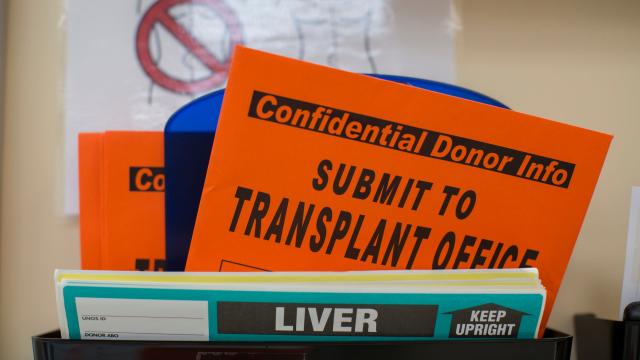New research out today in the New England Journal of Medicine highlights yet another impact of the opioid crisis: More people have gotten the organ donations they have needed in recent years because of more deaths caused by drug abuse and overdose. The research also suggests these donated organs aren’t any less safe than organs from a person who didn’t die of drug overdose.
The researchers looked at all reported organ donations that occurred in the US over a 17-year-period, from 2000 to 2016, and compared them to a database of donations made in several European countries over the same time. During those years, 103,805 brain-dead adult donors in the US donated at least one solid organ, while 27,661 deceased adults in the European countries donated organs.
In the US, the researchers saw a dramatic increase in the percentage of donors who had died from drug intoxication. There were just 59 such donors in 2000, making for 1.2 per cent of total donations that year, compared to 1,029 donors in 2016, or 13.7 per cent of all donations. The authors further found this shift largely accounted for the increase of transplants performed over the past five years. In Europe, there was no noticeable jump in the percentage of donors who died from drug intoxication or in the overall number of annual donations.
“In summary, the drug-abuse epidemic has been associated with a sharp increase in the recovery of organs from brain-dead donors in the United States but not in Europe,” the authors wrote.
Many of the authors themselves had anecdotally noticed the rise in organ donations from these deaths in the hospitals where they work. And the study isn’t the first to find that donations have increased as illicit and recreational drugs – primarily opioids – have started to kill more people. But it’s the first to compare US donations to those made across the Atlantic, senior study author Josef Stehlik, medical director of the Heart Transplant Program at the University of Utah, told Gizmodo.
The disparity found between the US and the European countries highlights how much the opioid crisis is an uniquely American problem, Stehlik said.
“Opioids are treated differently here,” he said. “First, there’s much less prescription of opioids for pain in Europe, so there’s less chance of addiction from people who started opioid use in a legal, medical way. Second, in many but not all European countries, the rate of illicit opioid use is either stagnant or decreasing.”
At the same time, the organs from these tragic deaths don’t seem to be less viable than other donated organs. Stehlik and his team looked at the first-year health outcomes of 2,360 people given either heart or lung transplants, since these are the organs that might be the most damaged from a low oxygen supply commonly seen in overdose victims.
“There were no significant differences between the patients who got donations from people who died of a drug overdose compared to donors who died of other causes,” Stehlik said. “So that’s really encouraging.”
The researchers hope their work can convince doctors and patients to be less afraid of using these organs.
“Transplants are always a sensitive issue to discuss, because there’s death involved,” Stehlik said, emphasising the need to reduce drug overdose deaths no matter what. “But in the unfortunate circumstance when these deaths happen, we sometimes see that the patient’s family, the family of the potential donor, and even the hospital staff are hesitant to rely on these organs because they think they’re not suitable for transplantation.”
“We need to take away this bias that patients who died from drug overdose aren’t good donors because of their medical history,” he added.
Stehlik said it’s difficult to know how often families and doctors choose not to donate or use organs from people who have died from drug overdose. The United Network for Organ Sharing estimates that there are typically over 100,000 Americans on a transplant waiting list.
Elsewhere, recent successful efforts have been made to transplant organs from people with once-disqualifying medical conditions like hepatitis C (now often curable with proper medication), as well as to transplant organs from one HIV-positive donor to an HIV-positive recipient.
[NEJM]
